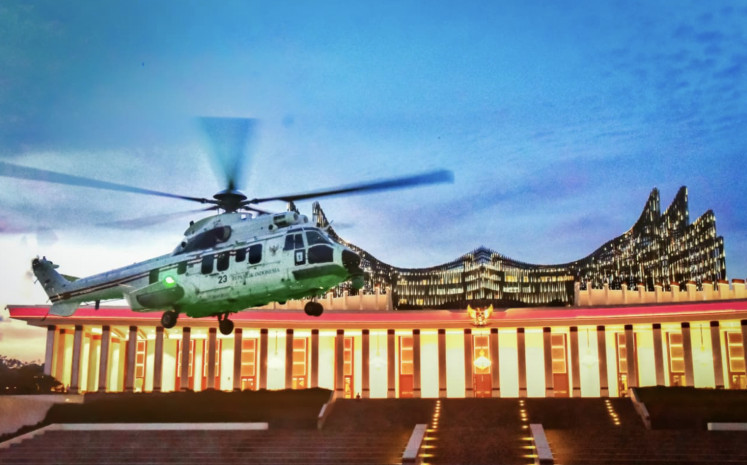Popular Reads
Top Results
Can't find what you're looking for?
View all search resultsPopular Reads
Top Results
Can't find what you're looking for?
View all search resultsThe US turning point and its impact on Indonesia
The United States has turned a new page in 2012 with a strategic policy that could shape a different US posture
Change text size
Gift Premium Articles
to Anyone
T
he United States has turned a new page in 2012 with a strategic policy that could shape a different US posture. Based on the policy, the US will be less prone to wars after officially pulling out of Iraq. This assumption is supported by President Barack Obama’s announcement of a nearly US$500 billion cut to the 2013 defense budget.
The final decision to call an end to the Iraq war has raised the question about whether the troop withdrawal created instability in Iraq. Soon after the withdrawal, 16 bombings occurred across the country and the bomb attacks escalated. While it is true that the task of maintaining security and stability is now solely in the hands of the Iraqi government, many argue that the US has won militarily but not achieved stability in Iraq.
John Mearsheimer of the University of Chicago argues that a US presence is essential to create a stable, democratic Iraq. In contrast to the US departure from Vietnam, Mearsheimer says, the US has left Iraq with a dysfunctional government.
In spite of the debate over the US presence in Iraq, the war is over. While the Obama administration has not handed the details of the defense budget cut to Congress, the new strategy reveals the US plan to deploy a more advanced technological defense strategy and reduce the number of ground forces, rather than air and naval forces. The plan also indicates that the US will focus its foreign policy objectives more on Asia.
With the change in strategy, Washington obviously needs partners to collaborate in achieving its foreign policy in Asia. Most Asian countries are likely to serve as effective partner candidates in diplomatic rather than military efforts. The US would confirm its commitment by using less military force.
US partnership with some countries in the region should not be difficult since President Obama has already built friendly relations with most countries in the region, including Southeast Asian nations. The US will become closer to Singapore, a long term-ally, and Indonesia, one of the US’ strategic partners. The US will continuously need more Asian allies and partners in this post-Iraq war period in the wake of China’s assertiveness.
However, China should not be seen as the only reason for the US change of policy toward Asia. With its new strategy, the US appears to be preparing to confront different types of states and diversified threats in Asia.
The US would confront the region, which is full of traditional security threats and challenges such as border disputes, transnational organized crime issues, and non-traditional security threats. However, by focusing on Asia, the US in turn would gain the opportunity to open more of its economy to the rest of Asia, not only to the “tigers”, China, Japan, South Korea and Singapore. This is an urgent step that the US needs to make at this point in time.
Additionally, after the US has concluded its military missions in Iraq and Afghanistan, anti-Americans are still likely to remain in these countries if the US government lacks strategies to win the hearts and minds of the countries in the region. Joseph S. Nye’s (2011) concept of Smart Power, which suggests that the combination of state resources produces solid culturally diplomatic strategies, is now more relevant for the US.
In this year’s election cycle, the turning point in the US’ strategic policy abroad and its domestic policy, could influence other countries’ approaches and the international system. Thus, the US diplomatic efforts in handling international affairs should promote the use of a diplomatic approach by other countries.
It is important to analyze how the US translates the turning point when dealing with countries and regions of conflict. In negotiating with countries such as Iraq, Afghanistan, Iran, Pakistan and North Korea, the US may still be tempted to use military options. If the US seeks to engage militarily with Asia, it must adopt a peaceful approach. But if the US opts to engage politically, through military strategy, another conflict may arise.
A lower profile in US defense and foreign policies will be more obvious in the future. But this still should be seen as a cautious response to the transition to international security and stability. The implementation of any type of diplomatic approach does not necessarily guarantee the creation of security.
As a strategic partner, Indonesia should view the new US policy toward Asia as an opportunity to broaden economic and security cooperation based on mutual benefit. The US-Indonesia bilateral security and defense cooperation in particular might have been more intense otherwise.
After a decade of internal military reform, Indonesia is now ready for military hardware modernization. The bilateral defense cooperation with the US would complement the process. However, it is too early to identify the real benefit because of the changing defense posture of the US toward Indonesia. Thus, Indonesia needs to be cautious in responding to policy shifts.
Indonesia must also be cautious of potential transition in Asia itself that could have immediate consequences on the security and stability of the region. This year, the Myanmar election and the progress of the succession in North Korea are two examples that might compromise the peace that Indonesia has promoted in the region thus far.
The writer is a lecturer at the Department of International Relations, Paramadina University Jakarta and a PhD student at the Department of Political Science, Northern Illinois University.










